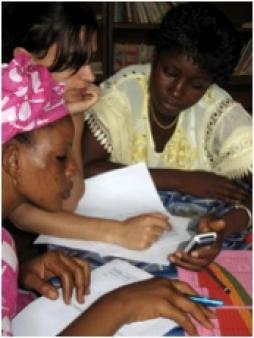Mali has one of the highest infant mortality rates in the world. There are roughly 111 deaths for every 1000 live births in the country and the under-5 mortality rate is 191 out of every 1000 children. The need for early detection of diseases and stronger local health structures led to the creation of Pesinet, a non-profit that uses mobile technology to provide regular health checkups and affordable health insurance for young children in Mali's capital, Bamako.
Roughly 600 children are currently enrolled in the program in the neighborhood of Bamako Coura, under the care of four Pesinet agents (each covering around 150 children). Pesinet combines both early warning systems and insurance. Families pay 500 CF a month for each enrolled child; the payments cover doctor examinations and half the cost of any medications the child needs if he or she gets sick.
Enrolled children are tested weekly for symptoms of illness such as fever, cough, diarrhea, low weight, or vomiting by community health workers who enter data from each visit into a custom-designed Java application on their phone. The data is sent via GPRS to an online database. Doctors at local community health centers monitor the patient data for sudden changes in health. If changes occur, the community health workers receive an alert on their phones and then go back, in turn, to alert the family that the doctor needs to give the child a checkup.
Pesinet's Lucie de Clerk recently contributed to an ICT4CHW (ICT for Community Health Workers) discussion. She writes, "The ICT system we use has been fully designed by us. It enables remote follow-up of children, keeping of medical records, and production of activity reports and health statistics. It is thus used for medical as well as management purposes."
De Clerck estimates that it takes the community health workers about ten minutes to complete each child's check-up and record the data. Only children that need immediate attention are contacted after the data is reviewed by the health center doctors, so the field workers only have to take action if something is wrong.
The organization is working to become self-sustaining through enrollments but is currently still partially dependent on funds raised outside of the insurance program. De Clerck writes "Our first aim was to achieve local operational self-financing, i.e monthly subscription fees covering the running costs of the service. Experience shows that we are able to achieve 50%, while the other 50% are currently covered by the funds we raise. We have yet to find a sustainable economic model."
De Clerck says that the community health workers adopted the technology quickly; she attributes the rapid pickup to a simple design and the relatively small amount of data collected. However, the organization has faced network connectivity issues which has resulted in the fieldworkers keeping separate, paper-based records and limiting the real-time usefulness of the program. This would also limit the use of Pesinet in more rural areas where network connectivity is weaker and Internet connections less reliable than in the capital (as the doctors at health centers need Internet access to view the data from the field workers). The organization is currently working on new specifications for its technology so that the application will be less reliant on mobile and web connectivity.
Another challenge was creating demand among beneficiaries, as insurance and preventative medicine are not very prevalent in Mali. So Pesinet and the field workers have to promote the idea of paying for non-sick children as a precaution against future illnesses. However, among the families of the 600 children who have been enrolled since the program launched, satisfaction rates are high.
A survey of participating families found that the service has been well received by beneficiaries so far; 94% reported satisfaction with Pesinet, 97% of participating families called the service "very affordable", and participating health centers have seen a 37% increase in visits through Pesinet subscribers.
For an in-depth look at Pesinet, check out our case study on the project, or listen to Pesinet co-founder Anne Roos-Weil describe the project in this video from the MobileActive Mobiles for Women Tech Salon.
Image via Pesinet website
| Pesinet: Mobile Monitoring and Micro-Insurance for Children in Mali data sheet 1280 Views | |
|---|---|
| Countries: | Mali |


Post new comment